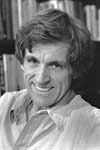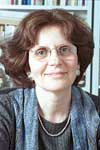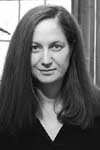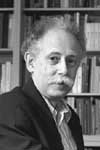Four faculty members receive Guggenheims
By Josh Schonwald and Steve KoppesNews Office
 Andrew Abbott |
Four University faculty members have received 2002 Guggenheim fellowships in the 78th annual U.S. and Canadian competition sponsored by the John Simon Guggenheim Memorial Foundation.
The four received funding based on distinguished achievement in the past and exceptional promise for future accomplishment. The 2002 Guggenheim fellows from the University are Andrew Abbott, Chairman and the Gustavus F. and Ann M. Swift Distinguished Service Professor of Sociology; Susan Gal, Chair and Professor of Anthropology and the College; Jonathan Rosner, Professor in Physics and the College; and Alison Winter, Associate Professor in History.
The 2002 fellowship winners, announced by Guggenheim Foundation President Joel Conarroe, include 184 artists, scholars and scientists selected from more than 2,800 applicants for awards totaling $6,750,000.
Decisions are based on recommendations from hundreds of expert advisers and are approved by the foundation’s board of trustees, which includes seven members who are past fellows of the Guggenheim Foundation––Conarroe, Joyce Carol Oates, Richard Rifkind, Charles Ryskamp, Jean Strouse, Wendy Wasserstein and Ellen Taaffe Zwilich.
 Susan Gal |
The 2002 fellows include writers, painters, sculptors, photographers, filmmakers, choreographers, physical and biological scientists, social scientists and scholars in the humanities. Chicago’s new Guggenheim winners described the academic endeavors they will continue with the aid of their Guggenheim fellowship awards.
Andrew Abbott has received a 2002 Guggenheim fellowship to complete his book Time and Social Structure, a process-oriented theory of the social world.
Abbott’s past research has varied widely; he has focused on the sociology of professions, urban sociology, historical sociology, the history of the Chicago School of Sociology, sociological methodology and general social theory. He has written four books, including Department and Discipline: Chicago Sociology at 100, The System of Professions and, most recently, Time Matters. One interest––the relationship between life-course time and social structure––has remained consistent throughout his career and has linked his disparate interests.
Abbott will continue his research in Chicago and at Nuffield College, Oxford. He hopes this work will serve as the foundation for a large-scale project to restudy the “Great Aspirations” sample of college graduates analyzed in the 1960s by Chicago demographer James Davis.
 Alison Winter |
Susan Gal will use her Guggenheim fellowship to challenge many of the widely held views about political language that were developed by scholars in the wake of the fall of communism in Eastern Europe.
Many Western scholars in the years since 1989, said Gal, have focused on the infamous censorship of state-controlled media, such as the Soviet Union’s Izvestia and Pravda, and the general paranoia pronouncements created. Some have even argued that the language and its consequent corruption of public and private life contributed to the fall of communism.
Rejecting an analysis of communist language as a topic in itself, Gal will use her Guggenheim fellowship to write a book manuscript that will present a reflexive, semiotic framework for understanding political language. Specifically, Gal, a leading scholar of Central Europe, will focus on political writing and oratory in Hungary during selected moments of the inter-war, communist and post-communist periods during the past century.
Gal’s 1979 book Language Shift: Social Determinants of Linguistic Change in Bilingual Austria is an influential work of sociolinguistic theory. Her book The Politics of Gender After Socialism, written with G. Kligman, offers a novel approach to the East European transitions. She also has co-edited two volumes on language and authority and on reproduction. In her forthcoming analysis of communist and post-communist political talk, her goal is to develop a more general approach to language and political authority that will encompass politics in various social systems.
 Jonathan Rosner |
Jonathan Rosner, a theoretical physicist, has received a Guggenheim fellowship to study the physics of heavy quarks and the structure of matter in a collaborative research project at the Cornell Electron Storage Ring at Cornell University.
Rosner will begin his nine-month Guggenheim fellowship in September 2003. He has timed his visit to accommodate a spring 2003 research visit to Chicago from a colleague, Michael Gronau of the Technion in Haifa, Israel. For the last several years, Rosner and Gronau have been collaborating on research related to sub-atomic particles that contain the bottom quark.
The Cornell Electron Storage Ring research team, over the next two years, will study the bottom quark and then retool the project’s accelerator to examine the charm quark with unprecedented accuracy. Comparing the properties of the charm quark and the bottom quark will be helpful in gaining new insights about what physicists refer to as strong interactions, those which hold protons and neutrons together inside an atom.
Among other issues, Rosner also will study how heavy quarks could help fill in more details about the theory known as CP violation. The theory explains why particles and antiparticles behave differently under certain circumstances, and why people, planets and the entire visible universe are made up of protons and neutrons instead of antiprotons and antineutrons.
Alison Winter has received a Guggenheim fellowship to support her work on a forthcoming book about the history of the sciences of memory.
Efforts to develop a “truth serum” or “truth technique”––methods to extract reliable memories––began during the early 20th century. Winter, a specialist in the history of human sciences, will examine attempts by American, British and French scientists to develop truth techniques, beginning in the late-19th century through the present.
Winter, who has previously written a book on the social and cultural history of mesmerism in Victorian Britain, will be writing during the course of her fellowship. The book, a chronological telling, will highlight key moments in the science of memory, such as the 1920s, when the notion of a “truth serum” first emerged, and the 1970s, when many American police departments became fascinated with the possibility that hypnotic techniques could refresh witnesses’ memory.
Winter aims to explain when, where, why and in what form the notion of a scientific truth technique developed.
![[Chronicle]](/images/small-header.gif)